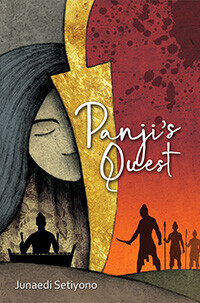Reviews
Kathy Foley, Distinguished Professor Emerita of Theatre Arts, University of California, Santa Cruz:
This deft translation from the Indonesian novel reveals to the anglophone reader the intricate adventures of East Java’s 12th century Prince Panji, who for so long captivated the courts and countryside of Southeast Asia through manuscripts, wayang puppet performances, and topeng mask dance. The flowing English captures and makes transparent complex ideas. In this retelling of the legend, the tragic heroine Angreni, Prince Panji’s beloved, hopes that “even long after her death people would remember her name with great respect and affection”. Setiyono fulfills that dream, making clear for 21st century readers the old tale of love, death, and renewal. Angreni’s story is perhaps the best known of the Panji narratives found in the manuscripts, which, as a group, joined the list of documentary heritage inscribed to UNESCO’s “Memory of the World Register,” in 2017. Panji’s Quest is a primer in Javanese courtly life and thought, wherein the ideal prince must be an excellent poet, heroic soldier, expert musician, and practiced lover, as well as a spiritually awakened being. The author juxtaposes the tale of wandering princes and princesses with the struggles of commoners, grounding the class-stratified world of the aristocrats.
==================
Dr. Lydia Kieven, Independent Lecturer and Researcher, Cologne, 30 April 2021:
One of the characteristics of the Panji stories is the variety of storylines embedded in different contexts, such as specific political and religious conditions. Junaedi Setiyono does the same: Within the classical Angreni story, he inserts dialogues on moral behavior and references to philosophical teaching of old Javanese traditions, as a means to enter critique and advice on religion, leadership, and physical love. Such interventions may be understood as critic and advice for present-day society in Indonesia. The creation of the figure named Tendas, who, unintentionally, gets involved in dramatical episodes, demonstrates the desperate subjection of commoners within the social hierarchy. Panji’s Quest offers wisdom for those who are open to it. The poetic descriptions of events make the reader delve into the atmosphere of the respective settings. The translation meets the challenge of transferring universal wisdom — through story set far away in time, place, and cultural background — to English readers.
==================
Eka Budianta, Indonesian Poet and Literary Critic:
Junaedi Setiyono presents a popular Javanese folktale in a detective story–like mode that makes the novel intriguing and compelling. For those knowledgeable about the Panji legend, the story’s ending is already known. But Setiyono’s elegant writing brings out suspense, unforeseen conflicts, and emotional turmoil, intersecting dark and moving moments with thrills of ecstasy that brought me tears of sadness and joy.
I was also drawn to the philosophical aspect of the novel. While it portrays a universe where human life is governed by the divine providence, human agency still plays defining roles. The most conscience-grilling part of the story is the tragic murder of Angreni, which is still of haunting relevance today.
Capturing the atmosphere and mood of the original novel, translator Oni Suryaman transports his readers to the 12th century Kadiri and Janggala kingdoms in Panji’s Quest.
==================
Virginia Shih, Southeast Asia Curator, South/Southeast Asia Library, University of California, Berkeley, USA:
The saga of Panji, as told in Panji’s Quest, intertwines numerous fascinating adventures and intricate episodes of didacticism, as well as reveals and revives an intangible cultural heritage of Javanese/Indonesian/Southeast Asian literature and performing arts that has been recognized by UNESCO’s “Memory of the World Programme” in 2017.
The wealth of the elegant Panji collection recorded in various formats, languages and scripts should be further preserved and promoted in research, teaching, and learning as “Panjiology” by the current and future generations of scholars in Southeast Asia and beyond.
Panji aficionados will know that Panji’s Quest originates from the Angreni from Palembang manuscript, the love story of Sekartaji, crown princess of the kingdom of Kadiri, and Panji, crown prince of the kingdom of Janggala ⸺ two Javanese kingdoms in the 12 th century that were reigned by rivaling siblings.
Translator Oni Suryaman has carefully transferred Setiyono’s eloquent writing style in this rendering of a Javanese folktale set in the 12 th century written to capture the interest of 21 century readers.
I am looking forward to adding Panji’s Quest and Tembang dan Perang, its original, to our collection.
==================





